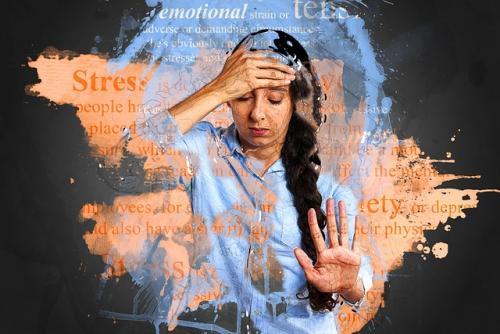When we hear the word “stress” we would often picture someone whose face has somehow evolved into the look of a crazy madman because of worry and anxiety. This is one of the emotional effects of stress. We also associate it with headaches and migraines. In short, stress is often associated with something negative.
However, did you know that not all stress is bad? We’ve got some good stress and bad stress examples for you here.

According to Psychology Today, stress can be good and useful. ULifeline further states that stress is actually key to survival. Sounds great, doesn’t it?
But before we go further, let us define the first the two types of stress.
The first one is called distress. Basically, this is what is known as negative stress. In medicine, it is a state wherein the person is not able to completely adapt to stressors and their resulting stress. Cambridge Dictionary defines it as a “great mental or physical suffering, such as extreme anxiety, sadness, or pain, or the state of being in danger or urgent need.” This is the popular type of stress. And for some, this might be the only type of stress that they know.
The second type of stress, the unpopular one, is called eustress. This came from the word “euphoria” which means intense excitement and happiness. This is also known as positive stress or good stress.
Now, let’s further differentiate distress and eustress by giving some examples:
Suppose your teacher in college says, “I’m going to push you outside of your comfort zone so you can gain some insight and get some growth, but it would be a little comfortable.” This is good stress or eustress. Being “pushed” a bit will definitely bring in some stress, but just enough to make you grow.
However, if your teacher pushes you too far out of your comfort zone by making you do things that are too uncomfortable, like forcing you to speak in public when you’re not ready, and your classmates end up laughing at you, then you will fall into the place of distress. For some, they would even go into a trauma because of this bad experience. They become frozen, stuck, and unable to move. In the end, they end up NOT growing.
Good and Bad Stress Examples – Positive and Negative Effects of Stress
To further elaborate on the two types of stress, let us look into the positive and negative effects of stress.
According to Psychology Today, being exposed to moderate levels of stress which you are able to master is a good thing since it can actually make you stronger and better able to manage stress. They compared it to a vaccine wherein if you will be given a minute amount of the bug, it will actually make you immune to the disease.

Here are some benefits of stress according to ULifeline
1. Stress is a burst of energy
Stress can motivate you to reach your daily challenges and goals. With the right amount of stress, you will be able to accomplish your tasks more efficiently as well as boost your memory.
2. Stress is a vital warning system
Stress produces the flight-or-fight response which is very important when you’re in the midst of danger. When you are under stress, you tend to have a laser-like focus such that you will be able to jump into safety in case you’re about to stumble into something dangerous.
3. Stress has health benefits
A little bit of stress is actually good. According to research, stress can actually strengthen your immune system. For example, it will improve how your heart works as well as protect your body from infection. An interesting study also showed that people who experienced moderate levels of stress before undergoing surgery actually recovered faster compared to those who had lower stress levels.
If moderate levels of stress can bring in some benefits, in the same way, too much stress can be detrimental to your health. This is true, especially for chronic stress. According to the American Psychological Association, “when stress starts interfering with your ability to live a normal life for an extended period, it becomes even more dangerous. And the longer the stress lasts, the worse it is for both your mind and body.”
MayoClinic listed common negative effects of high levels of stress or chronic stress:
 1. Stress has negative effects on your body.
1. Stress has negative effects on your body.
Too much stress can cause headaches, muscle tension or pain, chest pain, fatigue, change in sex drive, stomach upset, and sleep problems.
2. Stress can affect your mood
Chronic stress is the main cause of anxiety, restlessness, lack of motivation or focus, feeling overwhelmed, irritability or anger, sadness, and depression.
3. Stress also affects the way you behave
Your general behavior changes if you’re under too much stress. People experiencing this tend to suffer from overeating or undereating, angry outbursts, drug or alcohol abuse, tobacco use, social withdrawal, and lack of motivation to exercise.
How do we combat stress?
Stress is a part of our daily life. Every day, we experience new stressors. Bottom line is, we cannot escape stress. The challenge for us now is to maintain our equilibrium so that we can be resilient to stress. How do we do that?
- Get enough sleep
If we don’t have adequate rest, we would barely be able to handle the normal everyday stress. And if we experience fatigue because we don’t have enough sleep, a new stressor will surface. If you’re getting enough sleep, there will be fewer stressors.
- Organize
One of the things that stress people out is when everything seems to be a mess. When your desk looks like it’s been hit by a tornado or your car is total chaos, it tends to make you feel stressed out. That’s why it is important to be organized. Put things on a schedule. Make a to-do list. Make yearly goals, monthly to-do’s, even weekly and daily. Personal organization helps a lot in making you feel you have less stress.
- Exercise
Make it a daily habit to exercise. It somehow helps put away the stressors. Although exercise can also be considered a stressor on the body, it also relieves stress, anxiety, and tension.

The key to managing the emotional effects of stress is to look into the way you’re living your life and pinpoint the experiences that bring you bad stress.
For example, if the news on TV makes you stressed, then probably, you need to cut the time you spend watching TV or be more selective in the programs you’re watching so that you will minimize the stressors.
Finally, find enough stress that motivates you to grow and change, but be careful that you won’t be overwhelmed.
Remember, there are plenty of examples of good and bad stress. All stress is not created equal! And the emotional effects of stress are endless.

 1. Stress has negative effects on your body.
1. Stress has negative effects on your body.